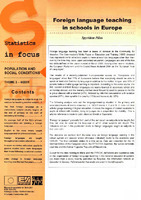Statistics in Focus: Population and social conditions. Foreign language teaching in schools in Europe. 2001.4

working document
Συγγραφέας
Eurostat
Pilos, Spyridon
Ημερομηνία
2001Προβολή/
Θεματικές επικεφαλίδες
Educational training ; Foreign language teachingΠερίληψη
Foreign language learning has been a cause of concern in the Community for decades. The Commission's White Paper on Education and Training (1995) stressed how important it is for all school pupils to have at least two languages other than their own by the time they leave upper secondary education. Languages are one of the five key skills defined at the Lisbon summit of March 2000. Among other recent initiatives, the European Parliament and the Council have declared 2001 as the "European Year of Languages". The results of a recently-published Eurobarometer survey on "Europeans and languages" show that 71% of Europeans believe that everybody should be able to speak at least one Community language in addition to his mother tongue, and 93% of parents believe that language learning is important. According to the same source, the first, second and third foreign languages are mainly learned at secondary school and on holiday abroad, and the learning method most frequently used by people in the EU is group classes with a teacher (46%), followed by informal conversation with a native speaker (17%), time spent in the country (15%) and home study (12%).
Αριθμός σελίδων
8p.Γλώσσα
ΑγγλικάΣημείωση
Downloaded from EU Bookshop.http://aei.pitt.edu/id/eprint/85233
